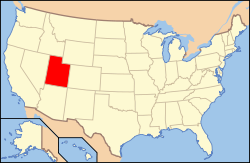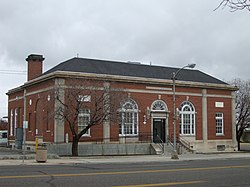Price, Utah
 From Wikipedia - Reading time: 10 min
From Wikipedia - Reading time: 10 min
Price, Utah | |
|---|---|
 Location in Carbon County and the state of Utah | |
 Location of Utah in the United States | |
| Coordinates: 39°36′14″N 110°48′01″W / 39.60389°N 110.80028°W | |
| Country | |
| State | |
| County | Carbon |
| Settled | 1879 |
| Founded by | Caleb Baldwin Rhoades |
| Named after | Bishop William Price |
| Area | |
• Total | 5.04 sq mi (13.04 km2) |
| • Land | 5.04 sq mi (13.04 km2) |
| • Water | 0.00 sq mi (0.00 km2) |
| Elevation | 5,627 ft (1,715 m) |
| Population (2020) | |
• Total | 8,216 |
| • Density | 1,654.82/sq mi (638.88/km2) |
| Time zone | UTC-7 (Mountain (MST)) |
| • Summer (DST) | UTC-6 (MDT) |
| ZIP code | 84501 |
| Area code | 435 |
| FIPS code | 49-62030[3] |
| GNIS feature ID | 2411491[2] |
| Website | www |
Price is a city in the U.S. state of Utah and the county seat of Carbon County.[4] The city is home to Utah State University Eastern, as well as the USU Eastern Prehistoric Museum. Price is located within short distances of both Nine Mile Canyon and the Manti-La Sal National Forest.
The population was 8,216 at the 2020 census,[5] making it the largest city in Carbon County.[4]

Geography
[edit]Price is located in west-central Carbon County at the northwestern edge of the Colorado Plateau. According to the United States Census Bureau, the city has a total area of 5.1 square miles (13.1 km2), all land.[6] The Price River, a tributary of the Green River, flows southeasterly through the city, and the San Rafael Swell is to the south.
The city is on U.S. Route 6 and U.S. Route 191. US 6 leads 67 miles (108 km) northwest to Spanish Fork on the Interstate 15 corridor, while US 191 leads northeast 54 miles (87 km) to Duchesne. The two highways together run southeast 64 miles (103 km) to the city of Green River and Interstate 70. Utah State Route 10 leads southwest from Price 21 miles (34 km) to Huntington.
Price was one of the communities that was served by the Rio Grande Zephyr passenger train. Today Amtrak's California Zephyr passes once a day each direction with a station about seven miles away in Helper.[citation needed]
Climate
[edit]According to the Köppen Climate Classification system, Price has a cool semi-arid climate, abbreviated BSk on climate maps.[7] It features cold winters and relatively moderate summers. The average high in January is 37 °F or 2.8 °C and it rises to 90 °F or 32.2 °C in July. The low in January averages 13 °F or −10.6 °C, and even in summer the dry climate keeps the nights cool, with an average of 58 °F or 14.4 °C. The all-time record high is 110 °F (43.3 °C), which was set on August 3, 1918, while the all-time low is −31 °F (−35 °C), set on December 26, 1924. Price lies in the rain shadow of central Utah's Wasatch Mountains so that precipitation averages only 9.13 inches or 231.9 millimetres annually. Late summer and early fall are the wettest times of year due to the Gulf of California monsoon that brings scattered thunderstorms to the region. The city also sees frequent snow during winter and early spring.[8][9]
| Climate data for Price, Utah (1968–2016) | |||||||||||||
|---|---|---|---|---|---|---|---|---|---|---|---|---|---|
| Month | Jan | Feb | Mar | Apr | May | Jun | Jul | Aug | Sep | Oct | Nov | Dec | Year |
| Record high °F (°C) | 62 (17) |
68 (20) |
75 (24) |
84 (29) |
91 (33) |
101 (38) |
107 (42) |
100 (38) |
95 (35) |
86 (30) |
69 (21) |
59 (15) |
107 (42) |
| Mean daily maximum °F (°C) | 36.9 (2.7) |
42.8 (6.0) |
52.5 (11.4) |
63.2 (17.3) |
72.5 (22.5) |
83.8 (28.8) |
90.0 (32.2) |
88.4 (31.3) |
79.5 (26.4) |
64.8 (18.2) |
49.5 (9.7) |
40.1 (4.5) |
63.7 (17.6) |
| Daily mean °F (°C) | 25.1 (−3.8) |
31.2 (−0.4) |
40.1 (4.5) |
48.9 (9.4) |
57.7 (14.3) |
68.1 (20.1) |
74.2 (23.4) |
72.7 (22.6) |
63.9 (17.7) |
51.0 (10.6) |
37.3 (2.9) |
28.4 (−2.0) |
49.9 (9.9) |
| Mean daily minimum °F (°C) | 13.4 (−10.3) |
19.7 (−6.8) |
27.6 (−2.4) |
34.6 (1.4) |
42.9 (6.1) |
52.1 (11.2) |
58.3 (14.6) |
57.0 (13.9) |
48.1 (8.9) |
37.5 (3.1) |
25.7 (−3.5) |
16.7 (−8.5) |
36.1 (2.3) |
| Record low °F (°C) | −15 (−26) |
−10 (−23) |
4 (−16) |
8 (−13) |
21 (−6) |
28 (−2) |
38 (3) |
34 (1) |
24 (−4) |
4 (−16) |
4 (−16) |
−15 (−26) |
−15 (−26) |
| Average precipitation inches (mm) | 0.75 (19) |
0.70 (18) |
0.66 (17) |
0.48 (12) |
0.64 (16) |
0.60 (15) |
0.81 (21) |
0.99 (25) |
1.10 (28) |
1.30 (33) |
0.54 (14) |
0.59 (15) |
9.16 (233) |
| Average snowfall inches (cm) | 7.2 (18) |
3.6 (9.1) |
0.9 (2.3) |
0.3 (0.76) |
0.0 (0.0) |
0.0 (0.0) |
0.0 (0.0) |
0.0 (0.0) |
0.0 (0.0) |
0.2 (0.51) |
1.8 (4.6) |
4.3 (11) |
18.3 (46.27) |
| Average precipitation days (≥ 0.01 inch) | 4 | 4 | 4 | 4 | 4 | 3 | 5 | 6 | 5 | 5 | 3 | 4 | 49 |
| Source: [8] | |||||||||||||
Demographics
[edit]| Census | Pop. | Note | %± |
|---|---|---|---|
| 1890 | 209 | — | |
| 1900 | 539 | 157.9% | |
| 1910 | 1,021 | 89.4% | |
| 1920 | 2,777 | 172.0% | |
| 1930 | 4,084 | 47.1% | |
| 1940 | 5,214 | 27.7% | |
| 1950 | 6,010 | 15.3% | |
| 1960 | 6,802 | 13.2% | |
| 1970 | 6,218 | −8.6% | |
| 1980 | 9,086 | 46.1% | |
| 1990 | 8,712 | −4.1% | |
| 2000 | 8,402 | −3.6% | |
| 2010 | 8,715 | 3.7% | |
| 2020 | 8,216 | −5.7% | |
| U.S. Decennial Census[10] | |||
As of the census[3] of 2000, there were 8,402 people, 3,045 households, and 2,085 families residing in the city. The population density was 1,979.7 people per square mile (764.4 people/km2). There were 3,311 housing units at an average density of 780.2 units per square mile (301.2 units/km2). The racial makeup of the city was 90.70% White, 0.26% African American, 1.37% Native American, 0.56% Asian, 0.04% Pacific Islander, 4.25% from other races, and 2.82% from two or more races. Hispanic or Latino of any race were 10.08% of the population.
There were 3,045 households, out of which 34.4% had children under the age of 18 living with them, 53.2% were married couples living together, 11.5% had a female householder with no husband present, and 31.5% were non-families. 27.4% of all households were made up of individuals, and 12.2% had someone living alone who was 65 years of age or older. The average household size was 2.60 and the average family size was 3.19.
In the city, the population was spread out, with 27.6% under the age of 18, 15.9% from 18 to 24, 22.5% from 25 to 44, 19.9% from 45 to 64, and 14.1% who were 65 years of age or older. The median age was 32 years. For every 100 females, there were 91.7 males. For every 100 females age 18 and over, there were 88.3 males.
The median income for a household in the city was $31,687, and the median income for a family was $39,429. Males had a median income of $37,476 versus $21,081 for females. The per capita income for the city was $14,313. About 11.4% of families and 15.0% of the population were below the poverty line, including 16.3% of those under age 18 and 11.1% of those age 65 or over.
2015
[edit]As of 2015 the largest self-reported ancestry groups in Price, Utah are:[11]
| Largest ancestries (2015) | Percent |
|---|---|
| English | 25.9% |
| German | 13.1% |
| Irish | 7.7% |
| Danish | 5.7% |
| Italian | 5.6% |
| Swedish | 5.2% |
| Scottish | 3.6% |
| Polish | 2.8% |
| Greek | 2.3% |
| French (except Basque) | 2.2% |
| Norwegian | 2.0% |
| Welsh | 1.9% |
| Dutch | 1.4% |
| Swiss | 1.2% |

Education
[edit]There are two public elementary schools in Price (Creekview and Castle Heights); one middle school (Mont Harmon); one high school (Carbon High School). It is also the location of the charter Pinnacle Canyon Academy, which serves grades K-12, as well as the Castle Valley Center for disabled children. Some children located in the Gordon Creek area attend Sally Mauro Elementary in Helper.
Price is the location of Utah State University Eastern, which has an enrollment of approximately 1,525.
Notable people
[edit]- Harold Arceneaux, professional basketball player
- Dean and Lynn Fausett, painters of the American West
- John D. Fitzgerald, author known for his The Great Brain series of books for children
- Herman Franks, former catcher, coach, manager, general manager and scout in Major League Baseball
- Dave Lauriski, head of the Mine Safety and Health Administration from 2001 to 2004
- J. Bracken Lee, mayor of Price from 1935 to 1947, governor of Utah from 1949 to 1957
- Cassandra Lynn, model, Playboy Playmate, born in Price
- Erik Pears, NFL offensive lineman
- Jean Westwood, first female chair of the Democratic National Committee; worked on several presidential campaigns
- Scott Woodward, molecular geneticist noted for his work with the discovery of the first genetic marker for cystic fibrosis
See also
[edit]- List of cities and towns in Utah
- Cleveland-Lloyd Dinosaur Quarry
- Helper, Utah
- KCBU
- National Register of Historic Places listings in Carbon County, Utah
References
[edit]- ^ "2019 U.S. Gazetteer Files". United States Census Bureau. Retrieved August 7, 2020.
- ^ a b U.S. Geological Survey Geographic Names Information System: Price, Utah
- ^ a b "U.S. Census website". Archived from the original on December 27, 1996. Retrieved January 31, 2008.
- ^ a b "Find a County". National Association of Counties. Archived from the original on June 26, 2015. Retrieved June 7, 2011.
- ^ "Quick Facts Price, Utah". U.S. Census Bureau, American Factfinder. Retrieved October 7, 2023.
- ^ "Geographic Identifiers: 2010 Census Summary File 1 (G001): Price city, Utah". U.S. Census Bureau, American Factfinder. Archived from the original on February 13, 2020. Retrieved August 10, 2015.
- ^ "Climate Summary for Price, Utah". Archived from the original on August 3, 2014. Retrieved March 24, 2014.
- ^ a b "Utah Climate Summaries – Price Warehouses". Archived from the original on March 7, 2012. Retrieved August 6, 2009.
- ^ "Utah Climate Summaries – Price Game Farm". Archived from the original on March 7, 2012. Retrieved August 6, 2009.
- ^ "Census of Population and Housing". Census.gov. Archived from the original on April 26, 2015. Retrieved June 4, 2015.
- ^ "American FactFinder - Results". Archived from the original on February 13, 2020. Retrieved March 22, 2017.
 KSF
KSF